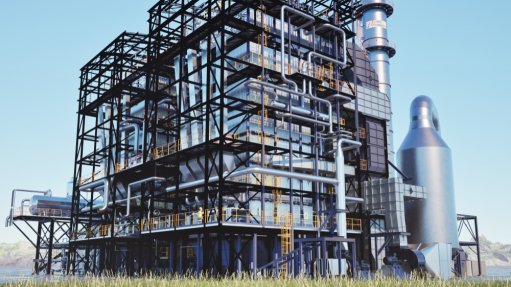Construction sector ailing as govt’s infrastructure plan stalls – MBA North
Following a harrowing two years for the construction sector, this year started with cautious optimism amid promises that a series of major infrastructure works would be fast-tracked, says Master Builders Association (MBA) North executive director Mohau Mphomela.
“Also, the value of building plans passed by larger municipalities in 2021 rose by 37.5%, compared with 2020, which saw a decline of 33.5%.
“It was anticipated that the economy would rebound in 2022, with an expansion of 9.1% in real terms predicted,” says Mphomela.
“The [construction] sector hoped that, if this was the case, it would be possible for the industry to stabilise at an average annual growth [rate] of 3.1% between 2023 and 2025.
“However, these positive forecasts were dimmed as a result of the Russian invasion of Ukraine, which disrupted global markets more than anticipated.”
By the end of the second quarter of this year, Statistics South Africa described the construction sector as being in the worst shape of all industries in terms of gross domestic product real value-added recovery from the impact of the Covid-19 pandemic – at 24% smaller than it was before the pandemic.
By September, the industry growth rate was –2.4%, with civil infrastructure projects increasingly delayed, says Mphomela.
Profit margins were narrower and turnover contracted by 9.8% year-on-year in nominal terms, to R72.4-billion in the first quarter of the year, although smaller enterprises bucked the trend by almost doubling their turnover.
Construction materials costs have also surged above the inflation rate, while an ultracompetitive market has further eroded profits in the sector, notes Mphomela.
“At the same time, liquidations continued, accelerating in the second quarter of this year, and increasing by 183% year-on-year, with the construction sector shedding a further 13 000 jobs between March and June this year.
“Only a handful of major construction companies are still trading – the others have diversified, gone out of business or are in business rescue.”
On the brighter side, the industry has made some recovery from the dip experienced during the series of Covid-19-related lockdowns, highlights Mphomela.
During the period June 2020 to May 2021, building plans to the value of R6.3-billion a month were registered, on average, while during the same period a year later (June 2021 to June 2022) the monthly average was R9-billion.
Despite margins being in the single digits and few major projects under way, contractors are seeing some growth in the residential and commercial markets, says Mphomela.
“Unfortunately, while more of these projects are indeed becoming available, unethical practices and the spread of so-called tender mafia activities are threatening profits and putting smaller contractors’ futures at risk.”
The Bargaining Council for the Civil Engineering Industry has stated that intimidation, extortion and violence on construction sites has reached crisis levels, causing losses of more than R40-billion by 2020, he notes.
“As far back as 2019, it was reported that at least 183 infrastructure and construction projects worth more that R63-billion had been affected by these disruptions across the country, according to a report by the Global Initiative against Transnational Organised Crime.
“Late payments and unethical business practices, such as amending contracts or forcing contractors to assume disproportionate risk, are further eroding profits and putting the sector at risk,” says Mphomela.
All Eyes on Infrastructure Pipeline
The construction sector’s big hope for recovery rests in government’s infrastructure development plan, which, unfortunately, has been slow in coming to fruition, says Mphomela.
“With R6.6-trillion in cumulative spend required by 2030, government continues to insist it plans to invest heavily in transport, energy, residential, telecommunications and industrial projects.
“However, based on past experience, it seems inevitable that these projects will not unfold as planned, and that tenders will take time to materialise and be adjudicated.”
“Two years ago, the MBA North welcomed the announcement that 88 investment-ready projects had been identified by the Presidency’s infrastructure and investment head Dr Kgosientsho Ramakgopa and Public Works and Infrastructure Minister Patricia de Lille, but we noted then already that time was running out to turn these plans into reality,” says Mphomela.
“Progress has been slow since then.
In fact, Standard Bank reported in May this year that almost a quarter of the country’s R340-billion strategic infrastructure projects had been delayed or put on hold.
“Yet again, the MBA North stands ready to work with government to implement these plans, and, yet again, we note that ongoing delays will further reduce our ailing sector’s ability to deliver on these ambitious projects.”
Article Enquiry
Email Article
Save Article
Feedback
To advertise email advertising@creamermedia.co.za or click here
Press Office
Announcements
What's On
Subscribe to improve your user experience...
Option 1 (equivalent of R125 a month):
Receive a weekly copy of Creamer Media's Engineering News & Mining Weekly magazine
(print copy for those in South Africa and e-magazine for those outside of South Africa)
Receive daily email newsletters
Access to full search results
Access archive of magazine back copies
Access to Projects in Progress
Access to ONE Research Report of your choice in PDF format
Option 2 (equivalent of R375 a month):
All benefits from Option 1
PLUS
Access to Creamer Media's Research Channel Africa for ALL Research Reports, in PDF format, on various industrial and mining sectors
including Electricity; Water; Energy Transition; Hydrogen; Roads, Rail and Ports; Coal; Gold; Platinum; Battery Metals; etc.
Already a subscriber?
Forgotten your password?
Receive weekly copy of Creamer Media's Engineering News & Mining Weekly magazine (print copy for those in South Africa and e-magazine for those outside of South Africa)
➕
Recieve daily email newsletters
➕
Access to full search results
➕
Access archive of magazine back copies
➕
Access to Projects in Progress
➕
Access to ONE Research Report of your choice in PDF format
RESEARCH CHANNEL AFRICA
R4500 (equivalent of R375 a month)
SUBSCRIBEAll benefits from Option 1
➕
Access to Creamer Media's Research Channel Africa for ALL Research Reports on various industrial and mining sectors, in PDF format, including on:
Electricity
➕
Water
➕
Energy Transition
➕
Hydrogen
➕
Roads, Rail and Ports
➕
Coal
➕
Gold
➕
Platinum
➕
Battery Metals
➕
etc.
Receive all benefits from Option 1 or Option 2 delivered to numerous people at your company
➕
Multiple User names and Passwords for simultaneous log-ins
➕
Intranet integration access to all in your organisation


















